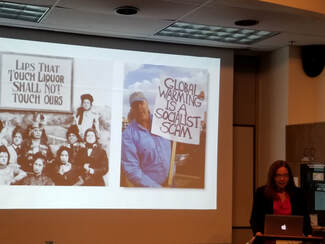|
Like the author of this blog entry, I attended atmospheric scientist Katherine Hayhoe's excellent talk last night on the challenges of communicating climate science in a politically polarized environment. As the author did such an excellent job recapping, I won't repeat the effort here.
Here is her book, which reaches out to an Evangelican Christian audience. It is currently out of print, but used copies are available online. I spoke with her afterwards and she said a second addition is coming out soon. She also produces Global Weirding--a series of short clips that tackle common climate misconceptions. I agree with her that we need a variety of approaches to communicate the ongoing truth of a changing climate driven primarily by human influences. Her approach is not exactly my own as I don't share in her faith, but I appreciate her excellent scientific work, well-developed presentation, and approachable personality. I also appreciated her openness about what drew her to climate communication, including marrying a climate change denier. I asked a follow-up question about convincing skeptical family members and she affirmed that this is the hardest. This reflects my own experience. All you can do is point people to the right resources regardless of outcome, so I've done my part. One thing in the presentation that stood out to me was just how polarized our country really has become. Probably we have not been so divided since just before the Civil War. Here is an article that makes just such a comparison and may explain why, though it obviously has it's own political bent.
0 Comments
|
Chris Dunn, PhD
Researcher, writer, explorer*, photographer, thinker. Wrestling with nature, culture, technology. Archives
July 2024
Categories
All
*When I use the term "exploration", I mean it in a personal sense (discovery for myself, or at a unique moment in time [everywhere after all--even crowded cities--endlessly await rediscovery--by new eyes and in new moments]), not in an absolute sense. With few exceptions (notably Antarctica), almost everywhere on earth has had other people around for a long time (though to varying degrees - high mountain tops or places like the interior of the Greenland Ice Sheet for instance were far less visited and populated, and undoubtedly at least some pockets of the earth were never visited or populated). It is an enlightening experience though when on an isolated ridge in what feels like the middle of nowhere to wonder if anyone has set foot there but never knowing for sure. What is significant is that the landscape itself is left in such a condition that it isn't evident. Some places ought to be kept that way.
|

 RSS Feed
RSS Feed